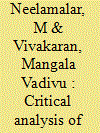| Srl | Item |
| 1 |
ID:
170631


|
|
|
|
|
| Summary/Abstract |
Jihadism’ (also known as the jihadi movement) is a popular term that signifies the Islamic terror movement which thrives on extremist ideologies and violence. In addition to the conventional practices, the online medium is currently being employed for disseminating these extremist ideologies across the globe. Radicalisation and recruitment of geographically dispersed individuals as ‘jihadists’ for supporting Islamic terror activities tend to be the primary intent for using the digital platforms as the medium of communication in this context. One such initiative by the Lashkar-e-Taiba of Jammu and Kashmir was the release of the ‘Wyeth: The Resistance in Flow’, an e-magazine which was launched on April 2018. The first issue which was posted with an open access option was primarily designed to influence the Indian youth population through the radical interpretations of Islam. Hence, it is crucial to analyse and understand the jihadi discourse of the Wyeth magazine in order to curb and counter-attack such initiatives at its initial phase. For this purpose, the present study aims to examine the content of the Wyeth magazine and analyse the basic traits of the jihadi propaganda and its potential to aid in the self-radicalisation process.
|
|
|
|
|
|
|
|
|
|
|
|
|
|
|
|
| 2 |
ID:
172818


|
|
|
|
|
| Summary/Abstract |
We examined whether and how social media play a role in the process of radicalization, and whether and for what purposes extremists use social media after they become radicalized within a sample of fifty-one Canadian extremists. Differences between converts and non-converts in terms of their radicalization process, involvement in terrorism, and social media usage were also investigated. Data were collected from a combination of media reports via an in-depth LexisNexis search and court records obtained from The Canadian Legal Information Institute database. The results confirm that social media played a role either during or after the radicalization process of the majority of the sample and converts are more vulnerable to online radicalization than non-converts.
|
|
|
|
|
|
|
|
|
|
|
|
|
|
|
|
| 3 |
ID:
163207


|
|
|
|
|
| Summary/Abstract |
Why do women become extremists? To what extent might they have self-agency? This paper examines the motivations and processes of female radicalization into the so-called Islamic State (IS) by drawing on a case study of Indonesian IS sympathizers, including the three migrant workers-turned-female suicide bombers whose radicalization was facilitated by social media. It argues that far from being coerced, most women join IS of their own free will. Prompted by a mix of personal crisis and socioeconomic and political grievances, the women embark on a religious seeking, exploring the various Islamic options available to them. Ideational congruence might spark the initial interest in IS, but it is generally emotional factors such as a feeling of acceptance and empowerment that make them stay. Contrary to common assumptions, women’s subordination in jihadist organizations is not absolute; it can be negotiated after joining. Most women try to conform to jihadist strict gender rules, but some, often with the support of male allies, try to bend the norms, including on female combat roles. The findings suggest that counter-terrorism agencies should abandon the binary view that women are either just brainwashing victims or terrorist provocateurs, and try to understand the gendered nuances of radicalization in order to formulate suitable preventive measures.
|
|
|
|
|
|
|
|
|
|
|
|
|
|
|
|